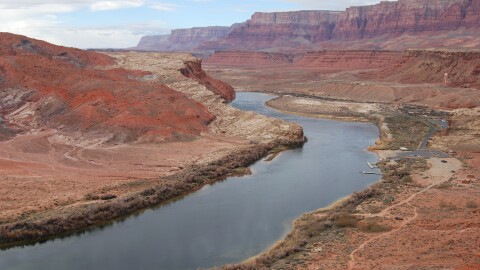-
Less federal pressure, worsening drought, and more interstate tension loom over Colorado River talksThe federal government manages the biggest dams on the Colorado River, but it hasn't been taking a forceful role in negotiations between the states on how to allocate increasingly scarce water in the basin.
-
In many of Colorado's rural mountain towns, basic services can be few and far between. This is something that especially impacts older residents. Limited social programming, or even the absence of a place to gather, can leave seniors isolated. In the tiny mountain town of Lake City, a group of locals is working to change that.
-
Colorado may restrict SNAP purchases of sugary drinks starting April 30, 2026, a public health move critics say limits personal choice.
-
For longtime ski racer Jessie Young, the debut of ski mountaineering at the upcoming Olympics marks the culmination of her two-year journey to earn a spot on Team USA — and the heartbreaking reality of elite sports.
-
The Colorado Bureau of Investigation announced Friday that it found no new evidence to conflict with the Pitkin County Sheriff's Office's original determination of suicide. CBI has been conducting an independent review of the 2005 case since September.
-
A group of Western Slope counties has completed research into the viability of opening a sustainable aviation fuel plant. They determined it wouldn't be cost competitive, based on current technology.
-
The Rocky Mountain Institute is a "think and do tank" with roots in the Roaring Fork Valley, working to facilitate climate solutions around the world. CEO Jon Creyts says renewable energy is affordable and reliable, and that most countries are racing to adopt it. This story is part of our "On the Ground" radio series.
-
From January 16-18, 2026, the First People's Festival in Estes Park brought together Indigenous artists, dancers, educators, and families for a fashion show, an art market, cultural demonstrations, and a powwow, creating a space for celebration, education, and remembrance.
-
Ridgway oil painter Emma Kalff talks about what it takes to make a living as a visual artist today, from balancing creative work with business demands to teaching online as a way to push back against isolation in rural communities.
-
Cold nights are important for preserving snowpack and making snow at ski resorts. Climate change is affecting both.
-
Experts say the federal government does not want to be the decision maker, and is pushing states to come to an agreement on future water use that will inform the river's post-2026 operating guidelines. CU Boulder's Chris Winter weighs in on the Interior's draft environmental impact statement.
-
Warm temperatures and a lack of snow have made for an anomalous winter in the Upper Colorado River Basin. While it's not "the new normal," winters are certainly warming up due to climate change.

















